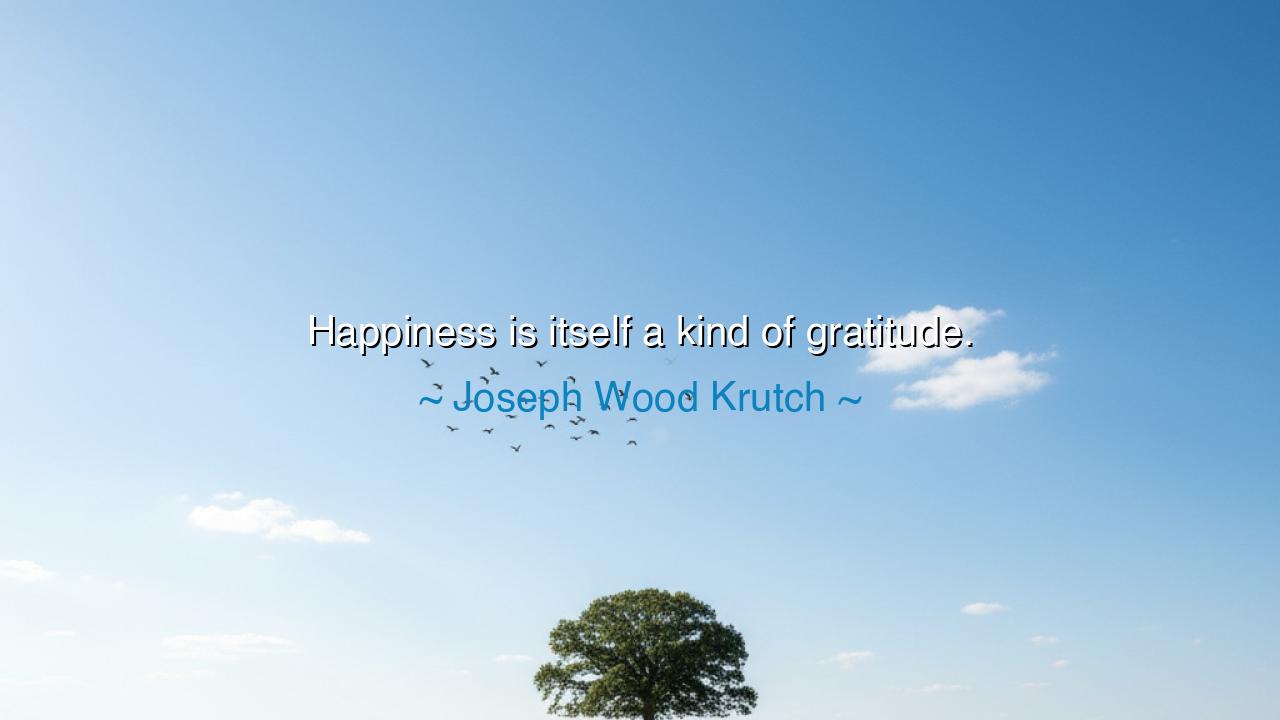
Happiness is itself a kind of gratitude.






“Happiness is itself a kind of gratitude.” Thus spoke Joseph Wood Krutch, the American writer, philosopher, and naturalist, whose quiet wisdom flowed from a life of deep reflection on nature and the human soul. In these few words, he reveals a truth that shines brighter the longer we gaze upon it—that happiness and gratitude are not two separate virtues, but two notes of the same divine harmony. To be truly happy is not to possess all that one desires, but to recognize and give thanks for what one already has. Happiness is not the reward for gratitude—it is gratitude itself, made alive within the heart.
Krutch was a man who once wandered the world of intellect and skepticism, questioning life’s meaning amid the rising noise of modern civilization. Yet later in his life, turning toward the simplicity of nature, he discovered a profound serenity in the small miracles of existence: the bloom of a desert flower, the call of a bird, the rhythm of the seasons. From that transformation was born this truth—that joy does not arise from conquest or abundance, but from appreciation. When we open our hearts to gratitude, we find that we already stand in the midst of happiness, though we had been blind to it.
In these words, Krutch speaks as the ancients once did. The philosophers of old—Marcus Aurelius, Epictetus, and Seneca—taught that the wise man does not demand more from life than what is given. He looks upon each day, each breath, as a gift from the gods, and in his gratitude, he becomes content. Happiness, they said, is not in the possession of things, but in the spirit that receives the present moment as enough. So too does Krutch remind us that joy does not come from outside the heart; it is born within, the offspring of a grateful mind.
To understand this truth, let us look upon the life of Helen Keller, who, though deprived of sight and sound, lived a life of radiant happiness. When asked how she could be so joyful despite her limitations, she replied, “So much has been given to me; I have no time to ponder what has been denied.” This is the embodiment of Krutch’s wisdom. Helen Keller’s happiness was not the absence of hardship, but the presence of gratitude—a deep awareness of life’s blessings that transcended loss. Her gratitude became her happiness; her happiness, her gratitude. Thus, she teaches us that even in darkness, the grateful soul finds light.
Gratitude, then, is not a mere courtesy or a passing emotion—it is a way of seeing. It transforms the ordinary into the sacred, the fleeting into the eternal. The one who is grateful does not live in constant hunger for more, but in constant wonder at what is. He tastes his bread as though it were manna, feels the sunlight as though it were a benediction. Such a person lives richly even amid simplicity, for every breath becomes a reason for thanksgiving. In gratitude, happiness ceases to be a pursuit and becomes a presence.
And yet, many in this age chase happiness as though it were a thing to be hunted—a treasure hidden in wealth, power, or pleasure. They toil endlessly, believing joy lies beyond the next achievement, the next possession, the next tomorrow. But Krutch’s wisdom stands against this endless pursuit. He reminds us that happiness begins not in accumulation, but in awareness. The moment we pause to give thanks—to truly see the beauty already within our reach—happiness comes to rest beside us, gentle and unbidden.
Therefore, let this be the teaching for all who seek peace in a restless world: cultivate gratitude, and happiness will follow like a faithful companion. Begin each day not with complaint but with acknowledgment of the gifts that surround you—the breath in your lungs, the warmth of sunlight, the presence of those you love. When hardship comes, search within it for the lesson, and give thanks even then, for the soul that can be grateful in adversity is unconquerable. As Joseph Wood Krutch teaches, happiness is not a thing to be earned, but a way to behold life. For in the heart that gives thanks, heaven already dwells; and in the mind that sees goodness, the world is already whole.






AAdministratorAdministrator
Welcome, honored guests. Please leave a comment, we will respond soon